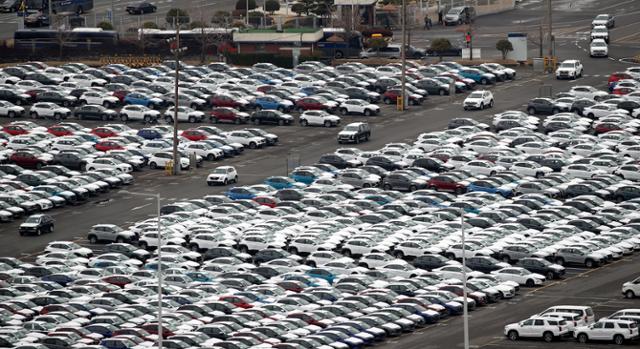
In February, finished cars are waiting in the yard next to the export shipping pier of Hyundai Motors’ Ulsan factory. News 1
The domestic current account remained in the black for 9 consecutive months. This is due to the strong exports of automobiles and semiconductors, which are Korea’s flagship export products.
According to the’International Balance for January 2021 (provisional)’ announced by the Bank of Korea on the 9th, the current account surplus in January was estimated at $7.60 billion (about 870 billion KRW). It has been in the black for the 9th month since May last year. The surplus was about $6.5 billion more than the same month last year ($580 million).
The commodity account surplus, which is a result of the import and export of goods, was $ 5.73 billion, an increase of $3.6 billion from the same month last year ($2.07 billion). Exports ($46.66 billion) increased 9.1% from a year ago, significantly outpacing the increase in imports (0.5%).
In particular, as the global trade recovery continued, cars and semiconductors, which are the main products of domestic exports, sold well. In fact, passenger car exports in January increased by 42.8%, 37.1% for information and communication devices, and 20.6% for semiconductors from a year ago.
As the road to travel abroad was blocked, the travel deficit ($550 million) decreased by $860 million from the previous year. Compared to a year ago, the number of inbound travelers decreased by 96% and the number of outbound travelers decreased by 97%. Accordingly, the size of the service account deficit in January ($610 million) decreased by a whopping $2.38 billion from a year ago ($2.89 billion).
Financial account net assets, representing capital inflows and outflows, increased by $5.28 billion in January. Foreign investment by Koreans increased by 2.2 billion dollars and domestic investment by foreigners increased by 570 million dollars.
With the rapid increase in the so-called’seohak ants’ investing in overseas stocks, Koreans’ overseas investment in overseas securities in January increased by $1.95 billion (about KRW 12.500 trillion), showing the largest increase in history on a monthly basis. Foreign investors’ domestic securities investment also increased by $2.3 billion. Foreigners’ domestic stock investment decreased by $1.79 billion from a year ago, but bond investment increased by $4.99 billion.
Coarse reporter [email protected]
News directly edited by the Hankook Ilbo can also be viewed on Naver.

